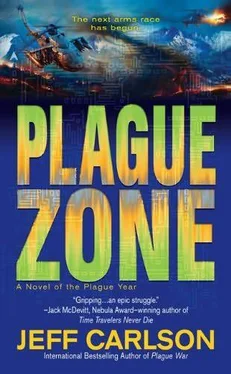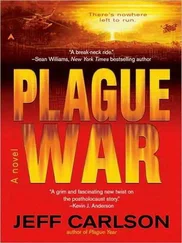Bornmann led their squad past burning campers and an overturned jeep. Debris lay everywhere, a mix of dark earth exploded from the hillside and lighter material blasted out of walls and furniture and people. Camouflage netting sagged from the structures or twisted on the ground in curls and lumps. Deborah saw a dismembered arm and a shoe and a field of broken glass.
She realized her uncertainty was pointless. She was one of the lucky ones. She reminded herself of it with every step. Even if she and Emma ran away, where would they go? Agonizing over it was a waste of energy.
Just do your part, she thought.
Deborah resolved her self-doubt as easily as that, and she was grateful. She felt like the eye of a hurricane, composed and intact despite the carnage all around her, even because of it. The chaos was exactly why she needed to remain pure. That was how she wanted to be remembered — competent and reliable — and no one would ever know otherwise if she kept her secret and followed orders to the end.
Suddenly they could see past the sprawl. The mountainside fell away to the northeast, where a familiar trio of peaks were lost in the filthy sky. Dark clouds crashed against the land in a billowing conflict of wind and heat.
The fallout will reach us, she thought.
“You’re going for Complex 2,” Walls said on the suit radio, breathing hard, and Bornmann answered, “Sir, we have to get out of the open. Then we’ll run for Complex 3 and resupply.”
“Rezac,” Walls said. “Any contact with 1?”
Rezac had been chanting to herself as they worked through the ruins, calling for Complex 1 or any allied assets. “No, sir,” she said. “Even if there are hardened units who survived the blasts, the sky is for shit. I’m getting nothing but static.”
“Your call sign is Viper Six,” Walls said, undeterred. “Authentication Hotel Golf India Sierra India X-ray. I want—”
“Missiles,” Pritchard said.
“Get down!” Bornmann shouted. “Where?”
“They’re at two o‘clock. Outgoing. I see three. Four. I think they’re ours.”
Within the turmoil to the northeast, yellow-white sparks raced into the sky. Deborah saw three flecks streaking intermittently through the haze. The rocket trails hurt her eyes, rising, rising… “Yeeaaah!” Pritchard cheered. His voice was savage and Deborah felt herself respond the same way, meeting his pride with a keen new predatory feeling of her own.
Smash ‘em, she thought.
The blinding white sparks were U.S. missiles intended for enemy targets.
Eight hundred miles west of Grand Lake, Colonel Jia Yuanjun walked alone through an empty hallway. The silence was bewitching. Solitude was so unlike his daily life. Part of him welcomed it even as he felt the hair on the back of his neck prickle with anticipation.
You shouldn’t be here, Jia thought, but this sublevel was a familiar place. He knew every corner. He went sixty paces into the damp, echoing shadows and moved left out of the corridor. This basement was always quiet. The architect who’d designed these bunkers had overdrawn his plans, no doubt hoping to impress his superiors, and their construction efforts had stopped long before completing the lowest floor. In many areas, the walls showed naked rebar. In others, there were no walls at all. Farther down the corridor, Jia knew there was a great room in which nothing stood except load-bearing pillars and scrawls of white paint to indicate where plumbing and electrical lines were never laid. The lighting consisted of only a few bulbs clipped to the ceiling. Nor was there heating or fresh air.
They’d built this base on the outskirts of Los Angeles, northeast of Pasadena, where the badlands had long since reclaimed the suburban sprawl, raking the streets and abandoned yards with sand. Beneath the sun-baked desert, however, the earth was cold, and the hundreds of people inside the compound were forever exuding moisture. Most of their breath, sweat, and cooking smells evaporated through the exits or dried up in the insufficient circulation of their fans, but Jia believed it was the living vapor of his fellow soldiers that made this sublevel so chilly. It smelled of people and earth, yet not in an evil way, mixed with the tang of concrete and iron. Jia was in the belly of their Army. He supposed that was exactly where he wanted to be. It was peaceful. He felt as if he belonged — and yet he’d risked everything by coming here.
A boot step ticked in the darkness.
What if you were followed? Jia thought. He sidled back against the wall, leaving the dim light entirely as the boot steps moved closer, gritting on the floor. One man? Two?
I was ashamed, he thought, rehearsing the same lies he’d planned for months. Why else would anyone hide themselves down here except to mourn their failures or their lost families? Access to this level was forbidden, but one of its entrances sat directly beside Jia’s quarters. The rooms below were used as storage space, giving him a plausible excuse to walk down here, and the crowded barracks were no place to show emotion.
If necessary, Jia would confess one weakness to conceal another. He had often done that to bind another man to him. He’d learned that if he volunteered one candid thought to a colleague or a rival, they felt empowered. Sometimes they would trust him enough to share their own truths. Less often, they reported him. Either way, he gained new relationships, either with the men who opened themselves to him or with the superiors who interrogated him and then saw his drive, his intelligence, and his humanity.
Neither the Communist Party nor the MSS wanted robots if they could have dedicated minds working for them instead. Automatons were easy to find. Men with initiative were not. This was how Jia had survived, but he’d always recognized that it was a double-edged sword.
One day, he would die on the wrong side of the blade. Today?
You shouldn’t have come here! he thought. Then he realized the boot steps were in front of him. The walking man had emerged from deeper within the basement. Jia allowed himself a small measure of relief. He had been pressing his shoulder blades against the hard concrete but now he leaned forward into the light, masking his nerves with an alert expression.
“N ho,” he said. Hello.
The other man jerked in surprise, then glanced left and right before saluting. With anyone else, his poor form would have earned a reprimand, but Jia was touched by the fear in Bu Xiaowen’s eyes.
“Colonel,” Bu said. “Are you… I didn’t think…”
“I needed a moment to compose myself,” Jia said. Then he added, “None of my team have slept since yesterday. General Zheng excused us.”
They both listened to the silence. Somewhere, a far-off noise resonated through the concrete. Pang. But there was no one else in the basement and Jia stepped forward and grabbed the front of Bu’s uniform. He pulled Bu’s open mouth against his own for a fierce, exciting kiss.
Jia had not chosen to be the way he was. He certainly did not celebrate his sexuality, but the attraction between himself and men like Bu Xiaowen was undeniable. They never needed words. They just knew. Jia supposed it was the same way in which heterosexual men and women felt a mutual spark. Their bodies were simply calibrated that way, and Jia and Bu had watched each other for weeks before they first discovered a chance to exchange a few words, unheard and unseen, in one of the stairwells.
He lowered his hands to Bu’s hips. He could not feel them beneath Bu’s gun belt, and yet he enjoyed the frustration of it because undressing each other was usually their only fore-play. Their sexual encounters were always rushed.
Читать дальше












